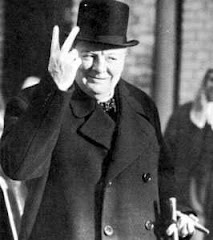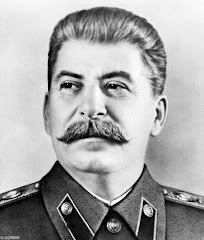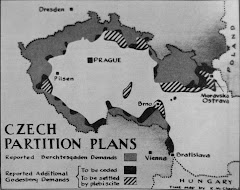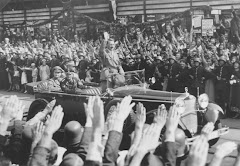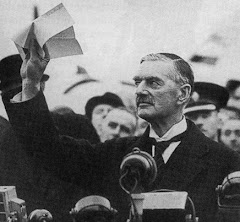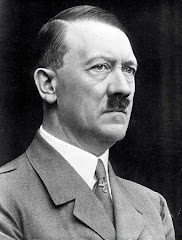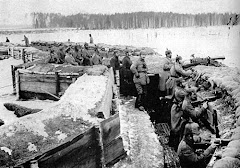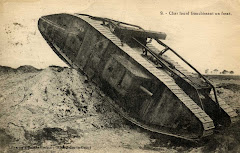Thursday, September 5, 2013
Posting #3- The Paris Peace Conference
Major Theme: Post war peace negotiations
Please respond to each of the following primary sources dealing with the Paris Peace Settlement. You may take your own approach or answer the questions provided:
1.) Hitler's View of the Versailles Treaty (Written in Mein Kampf-My Struggle)
When in the year 1919 the German people was burdened with the peace treaty, we should have been justified in hoping that precisely through this instrument of boundless repression the cry for German freedom would have been immensely promoted. Peace treaties whose demands are a scourge to nations not seldom strike the first roll of drums for the uprising to come...We had to form a front against this treaty and engrave ourselves forever in the minds of men as an enemy of this treaty, so that later when the harsh reality of this treacherous frippery would be revealed in its naked hate, the recollection of our attitude at that time would win us confidence.
*What does this expert from Mein Kampf tell us about Hitler's reaction to the treaty?
2.) The Economic Consequences of the peace: A British View (John Maynerd Keynes' View)
The treaty is no treaty, because it is now generally recognized that in truth it settles nothing...If you pledge a man to perform the impossible, you are no nearer a decision as to what in fact he has to do: for his pledge is, necessarily a dead letter. The reparations clauses of this treaty are its most important economic feature. But being composed of foolish, idle words, having relation to real facts, they are without practical effect, and they leave the prospects of the future undetermined...This treaty ignores the economic solidarity of Europe, and by aiming the economic life of Germany it threatens the health and prosperity of the Allies themselves...by making demands the execution of which is in the literal sense impossible, it stultifies itself and leaves Europe more unsettled than it found it.
* What are the major criticisms made of the Treaty of Versailles by John Maynard Keynes? Were his predictions true?
3.) The Paris Peace Settlement: A British Assessment (a view from a British delegate at the conference)
The historian, with every justification, will come to the conclusion that we were very stupid men. I think we were...We came to Paris confident that the new world order was about to be established; we left it convinced the new order had fouled the old...We arrived determined that a peace of justice and wisdom should be negotiated: we left it conscious that the treaties imposed were neither just nor wise...It is impossible to read German criticism without deriving the impression that the Paris Peace Conference was guilty of disguising an imperialist peace under the surface of Wilsonism...Hypocrisy was the predominant and inescapable result...We had accepted a system for others which, when it came to practice, we should refuse to apply to ourselves.
*Does this impression of the treaty coincide (match) with your opinion of its clauses (e.g. limits on military, reparations etc.)
4.)Reparations against Germany: An American View (viewpoint of an American delegate at the Paris Peace Conference)
The magnitude of the reparations demanded of Germany under the treaty...placed great strain upon credit. Largely on this account there was a widespread collapse of the entire pre-war system of goods and services and investments. The pre-war gold system has collapsed and a large part of the world functions in terms of closed international dealings restricted to barter...The reparations clauses contributed largely toward a German psychology which has changed the political complexion of much of the world.
*According to this delegate what are the major weaknesses of the treaty? What is the American opinion of the treaty and what is the major effect they are concerned with?
Please read the following pages in your text: 129-130
Possible Essay Topics: Was the Treaty of Versailles a valuable tool to maintain peace in Europe? Was the treaty a cause for a future war?
This posting is now open and will close on Oct 9th. The essay is due on Oct 10th. The following students will be asked to participate: Natalie N., Hayden P., Cameron P., Fernando Q., Luke R., Kate S., Uel S., Glen V., Shayna W., Alexandra W., Cameron W., Christi S.
Posting #2- The Bosnian Crisis
Major Theme: The Origins of the First World War.
The out break of war in 1914 grew out of a short term crisis in the Balkans. However one must take into account a number of long standing developments:
1.) A balance of power that was maintained in Europe for much of the nineteenth century (France/Britain) was crumbling
2.) European Powers viewed international relations (colonies) as a battle for survival and source of status
3.) The Rise of Germany as the second largest European power encouraged the growth of alliances
4.) Nationalistic groups demanding self determination/independence threatening old empires
On the morning of July 28th a young Bosnian nationalist Gavrillo Princip, backed by the 'black hand' walked through a mass of people in the crowded streets of Sarajevo. He approached the car of Archduke Ferdinand and the Duchess Sophia, pulled a hand gun and shot them both dead. The Austro-Hungarian government blamed the whole affair on Serbia who had been linked through an intercepted message. Within a matter of about a month the whole of Europe was embroiled in what was soon to be dubbed the Great War/WWI.
*Many historians blame the outbreak of war on this July Crisis: the actions of Princip and the reactions of the Serbians and Austro-Hungarians. Do you believe that the war could have been prevented given this assassination had never happened? Remember to use supporting information from your notes, the Internet, class discussions and the online lecture for unit one (if you have time to listen to the first 20 min or so. The following website should give you a more thorough understanding of the causes for a European conflict:
http://www.firstworldwar.com/origins/causes.htm
Please read the following pages in your text pg-32-37
This posting is now open and will close on October 9th, the essay is due Oct 10th. The following students are asked to participate: Mitchell H., Jennifer H., Adam K., Cameron L., Matty M., Alyssandra M., Megan M., Dale N.
Possible Essay Topics: Was the murder of Ferdinand and his wife the cause of war in 1914? Would war have broken no matter what the outcome of the Bosnian Crisis? What was the most important cause of the First World War?
Wednesday, September 4, 2013
Posting #1- The Naval Race
Britain vs. Germany
By the end of the twentieth century Britain, as you can see on page 22 in your history text, had the largest empire in the world. It was described as “the empire on which the sun never sets”. Think about why it was given this description.
Britain also had the largest navy. This large navy was necessary for the following reasons:
1.) To protect the empire.
2.) To protect food supplies coming across the oceans. Britain could not grow enough food to feed her crowded population.
3.) To protect her trade routes. Britain’s wealth depended on selling her manufactured goods.
4.) To protect her against invasion from the mainland of Europe.
In contrast Germany’s strength lay in her army. The great nineteenth century German statesman, Otto von Bismark, believed that Germany and Britain should be friends. He said, “a land rat has no quarrel with a water rat.” However, in 1890 the young German emperor (Kaiser Wilhelm II) dismissed his most trusted, experienced and level headed chancellor, Bismark. The Kaiser was said to be an arrogant, unpleasant man who hated the idea of Britain being so much stronger on the oceans than Germany. He therefore ordered a massive increase in the German navy.
The naval race had now begun as Britain and Germany entered a great battle to build more and better warships. In 1906 Britain launched the first of a new kind of super-battleship, called the H.M.S Dreadnought. All ships of this kind were became known as ‘Dreadnoughts’. Many people in Britain became worried about the German naval threat. They were concerned that Germany would build more Dreadnoughts than Britain.
Please read the following excerpt from a British Newspaper and decide which of the statements below, you can agree with. Be sure to give solid reasons for your decision.
“After a long interval devoted to more controversial but less important subjects, the House of Commons today resumes the discussion of the Navy Estimates, and it is believed that Mr. McKenna will announce the decision to lay down four additional Dreadnoughts. This decision will be welcomed throughout the Empire. We should all of us be glad if it were possible to dispense with the proposed increase in the navy, and still more glad if it were possible to reduce the present vast expenditure. But nations, like individuals, have to take facts as they find them; and the dominating fact of the existing situation is the unconcealed desire of Germany to challenge out naval supremacy. That desire is quite intelligible. The Germans are a great people, and they wish to be second to none either on land or sea. We, however, are compelled to look at the problem from our point of view, and not from theirs. To us, sea supremacy is a necessary of national life; to Germany it is a luxury of Imperial ambition. If we lost the command of the sea our commerce could be destroyed and our industries brought to a standstill, and the overwhelming German army could affect landing where it listed. Germany runs no such risk. The utmost injury we could inflict upon her would be to blockade Hamburg and Bremen, and force her to send overland that portion of her foreign commerce which now passes through these ports. Her ordinary industrial life would continue almost unaffected. The stakes are, therefore, not even. She is playing for pride, we are playing for life- and we mean to win.”
(Daily Graphic, 26 July 1909)
1.) Read the following extract and decide with which of the statements below it you can agree. Give the reasons for your decisions.
a) The writer believed that other countries as well as Britain would benefit from extra Dreadnoughts.
b) It was not necessary for Germany to have a large navy.
c) Because this extract comes from a British newspaper it is bound to be a fair summary of the matter.
2.) Do you believe that the naval race was a cause for war in 1914? What role did technology and the industrialization of Europe play in the outbreak of war? If you were a British subject living in Canada would you support the war effort? Would you expect that the Canadian government ‘follow suit’ with Great Britain and enter a European conflict? (see pages 21-30 and 32-40 in your text)
Possible Essay Topics: a) Great Britain was the cause of the Naval Race before 1914. b) Germany was the aggressor during the Naval race before 1914. c) The Naval Race was a result of the industrialization of Europe before 1914. d) The Naval Race was the result of centuries of Imperialism.
This posting is now open and will close on Oct 10th. The essay for this posting is due Oct 9th. The following students will be involved with this posting: Hailey A., Daniel A., Delaney B., Chelsey B., Megan Broe., Natasha D., Lexi d., Carly D.
Subscribe to:
Comments (Atom)



